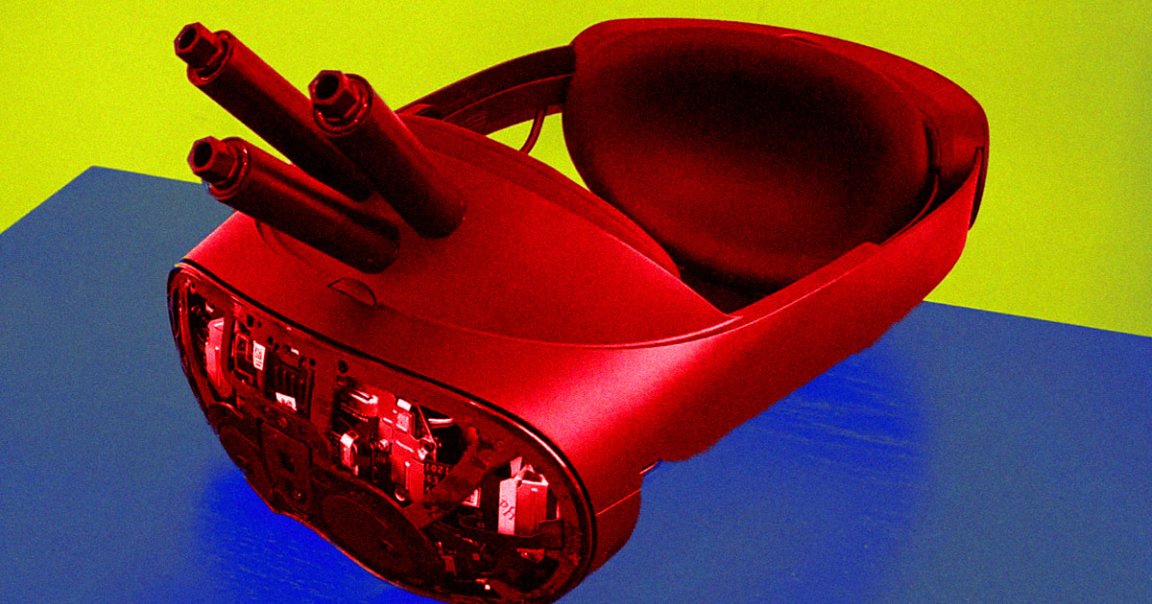
Oculus founder and defense contractor Palmer Luckey claims to have built a VR headset that, should its wearer’s avatar die in a game, blows up the user’s head with “explosive charge modules.” Ha ha. Cool…
“The idea of tying your real life to your virtual avatar has always fascinated me — you instantly raise the stakes to the maximum level and force people to fundamentally rethink how they interact with the virtual world and the players inside it,” Luckey wrote in a blog post about the grim prototype. “Pumped up graphics might make a game look more real, but only the threat of serious consequences can make a game feel real to you and every other person in the game.”
“If you die in the game,” he wrote, paraphrasing an age-old trope, “you die in real life.”
There’s a lot to unpack here, and if literally anyone else had claimed to to invent such a gadget, we might not pay them too much mind. But Luckey isn’t just any ol’ programmer. He’s widely considered the father of modern VR. Tech he built is currently serving as the foundation for Facebook CEO and wannabe deity Mark Zuckerberg’s metaverse, and combine his VR wizardry with the reality that he now makes expensive weapons for a living?
Toss in the fact that he’s been vocal about wanting to make something like this happen for some time now, and he has unusual credibility in this particular domain.
Per Luckey’s blog, the device is a tribute to NerveGear, the fictional killer headset in the popular VR-theme manga series “Sword Art Online,” which melts wearers’ brains with microwaves if they fail to escape a virtual game where they’ve been trapped by a mad scientist.
The series, he wrote, was intrinsic to both his and Oculus’ success. Thus, it seems his alleged new invention is intended as both a self-serving adrenaline high and a twisted thank you.
“The popularity of [Sword Art Online] led to massive otaku enthusiasm for Oculus, especially in Japan, which quickly became our 2nd largest market,” he wrote. “In turn, the existence of the Rift made [Sword Art Online] itself seem far more plausible and grounded — a story that had been written in a world where VR was a dead technology was now straight out of the gamer hype headlines.”
In what may be another dig at Mark Zuckerberg’s efforts to build his platform into a cohesive commercial product, Luckey quipped that the murder part of the device is already working, but that the VR component still needs work.
“The good news is that we are halfway to making a true NerveGear,” he wrote. “The bad news is that so far, I have only figured out the half that kills you. The perfect-VR half of the equation is still many years out.”
The explosive charges in the headset, he says, are “[tied] to a narrow-band photosensor that can detect when the screen flashes red at a specific frequency.”
“When an appropriate game-over screen is displayed,” he continued, “the charges fire, instantly destroying the brain of the user.”
Luckey did admit that he hasn’t yet had “the balls” to actually try the headset on; the equipment, he says, is still too volatile.
“At this point, it is just a piece of office art, a thought-provoking reminder of unexplored avenues in game design,” Luckey wrote. “It is also, as far as I know, the first non-fiction example of a VR device that can actually kill the user. It won’t be the last.
More on the fact that Luckey has been interested in doing this for a while: Oculus Founder Suggests Video Games That Kill You in Real Life